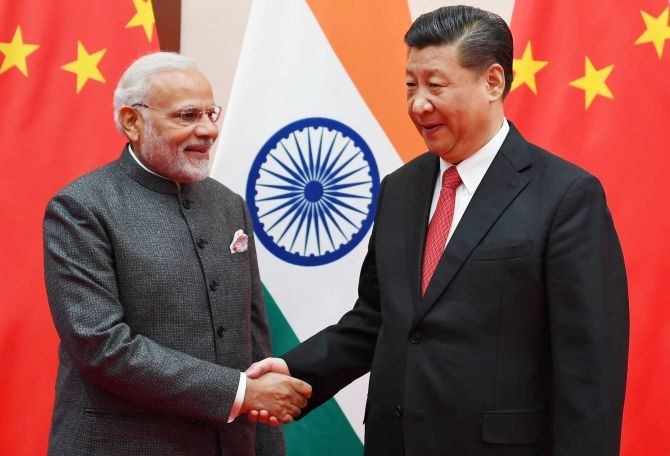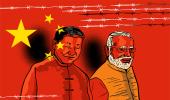
The entry of India and Pakistan into the Shanghai Cooperation Organisation would bolster its strength, Chinese President Xi Jinping said on Sunday as he welcomed Prime Minister Narendra Modi and Pakistan President Mamnoon Hussain to the eight-member grouping.
Prime Minister Modi and Pakistan President Hussain attended the summit for the first time after both countries were were admitted as members of the Beijing-based Shanghai Cooperation Organisation (SCO) last year.
Xi, also host of the 18th SCO summit, in his opening remarks said that the presence of Prime Minister Modi and Pakistan President Hussain at the meeting in the east Chinese port city of Qingdao was 'of great historic significance'.
"The SCO enjoys strong vitality and momentum of cooperation," Xi said, attributing the organisation's standing to the Shanghai Spirit. He called for the pursuit of common, comprehensive, cooperative and sustainable security.
"We should reject the Cold War mentality and confrontation between blocs and oppose the practices of seeking absolute security of oneself at the expense of the security of other countries, so as to achieve security of all," he said.
He said countries should work for promoting open and inclusive cooperation for win-win outcomes.
"We should reject self-centered, short-sighted and closed-door policies. We should uphold WTO rules and support the multilateral trading system so as to build an open world economy," Xi said amidst a looming trade war between China and the United States over tariffs.
Later, addressing a press conference at the conclusion of the summit, the Chinese President said the SCO members will uphold the authority and efficacy of WTO rules, strengthen an open, inclusive, transparent, non-discriminatory and rules-based multilateral trading regime, and oppose trade protectionism of any form.
"We point out that economic globalisation and regional integration are the compelling trend of our times," Xi said.
He said all parties will continue to work in line with the principle of mutual benefit to improve regional economic cooperation arrangements, deepen cooperation in business, investment, finance, connectivity and agriculture, advance trade and investment facilitation to deliver benefits to the people and add fresh impetus to global growth.
"We have agreed to abide by the goals and principles of the SCO Charter, carry forward the Shanghai Spirit of mutual trust, mutual benefit, equality, consultation, respect for diversity of civilisations and pursuit of common development," he said.
The SCO members have agreed to jointly pursue regional peace, stability and development by promoting good-neighborliness and friendship and deepening practical cooperation, Xi said.
Earlier, in his address, Xi called for adhering to extensive consultation, joint contribution and shared benefits in global governance, steadily reforming and improving the global governance system, and pushing all countries to jointly build a community with a shared future for humanity.
The SCO member states need to actively implement the 2019-2021 programme of cooperation for combating terrorism, separatism and extremism, he said. Member nations should enhance cooperation on defence security, law enforcement security and information security, Xi said.
Xi said that the SCO members need to build a powerful engine to achieve common development.
China will set up a 30-billion-yuan ($4.7 billion) equivalent special lending facility within the framework of the SCO Inter-bank Consortium, Xi said.
The SCO has eight member countries which represents around 42 per cent of the world's population and 20 per cent of the global gross domestic product.
Besides Prime Minister Modi and President Xi, other leaders attending the summit include Russian President Vladimir Putin and Iranian President Hassan Rouhani.
The SCO was founded at a summit in Shanghai in 2001 by the presidents of Russia, China, Kyrgyz Republic, Kazakhstan, Tajikistan and Uzbekistan. India and Pakistan became its members last year.
Prime Minister Modi had detailed discussions with President Xi on bilateral and global issues on the sidelines of SCO summit on Saturday.
Xi suggested to Modi that China and India should set up a new bilateral trade target of $100 billion (Rs 6.5 lakh crore) by 2020, as Beijing is looking at importing non-Basmati rice as well as sugar to address the huge trade deficit.
Addressing a press briefing after the Modi-Xi meeting, the second in nearly six weeks, Foreign Secretary Vijay Gokhale said that President Xi suggested to Prime Minister Modi that India and China should set up a new bilateral trade target of $100 billion by 2020.
The bilateral trade in 2017 rose by 18.63 per cent year-on-year to reach $84.44 billion.
The two countries had earlier set a bilateral trade target of $100 billion by 2015.
Gokhale said that India has allowed China's state-owned Bank of China to open its branch in Mumbai.
"There were some discussion on trade and investment related issues. And in that context Xi told Modi that China is looking at enhancing agricultural exports from India including non-Basmati rice and sugar," Gokhale said.
An agreement was signed between China's General Administration of Customs and India's Department of Agriculture, Cooperation and Farmers Welfare on Phytosanitary requirements for exporting rice from India to China, one of the world's biggest rice markets.
The 2006 Protocol on Phytosanitary Requirements for Exporting Rice from India to China has been amended to include the export of non-Basmati varieties of rice from India.
At present, India can only export Basmati rice to China.
A couple of business delegations from India and the department of commerce have visited China in the recent months and it is hoped that this will lead to additional imports from India this year, he said.
"The Chinese side also said that it will encourage our pharmaceutical companies to register for high quality Indian pharma products in the Chinese market. This was an important aspect from our perspective because we have been pressing for greater pharma exports into the country," the foreign secretary said.
In response to the president's suggestion for enhancing financial cooperation between the two countries and also helping trade, the Prime Minister conveyed to President Xi India's readiness to permit the Bank of China to establish its branch in Mumbai," Gokhale said.
China has been promising to address the issue of trade deficit with India which has been seeking a greater market access for its goods and services in China.
Trade deficit with China stood at USD 36.73 billion during April-October this fiscal.
India's trade deficit with China has marginally dipped to $51 billion (Rs 3.31 lakh crore) in 2016-17 from $52.69 billion (Rs 3.42 lakh crore) in the previous fiscal.








